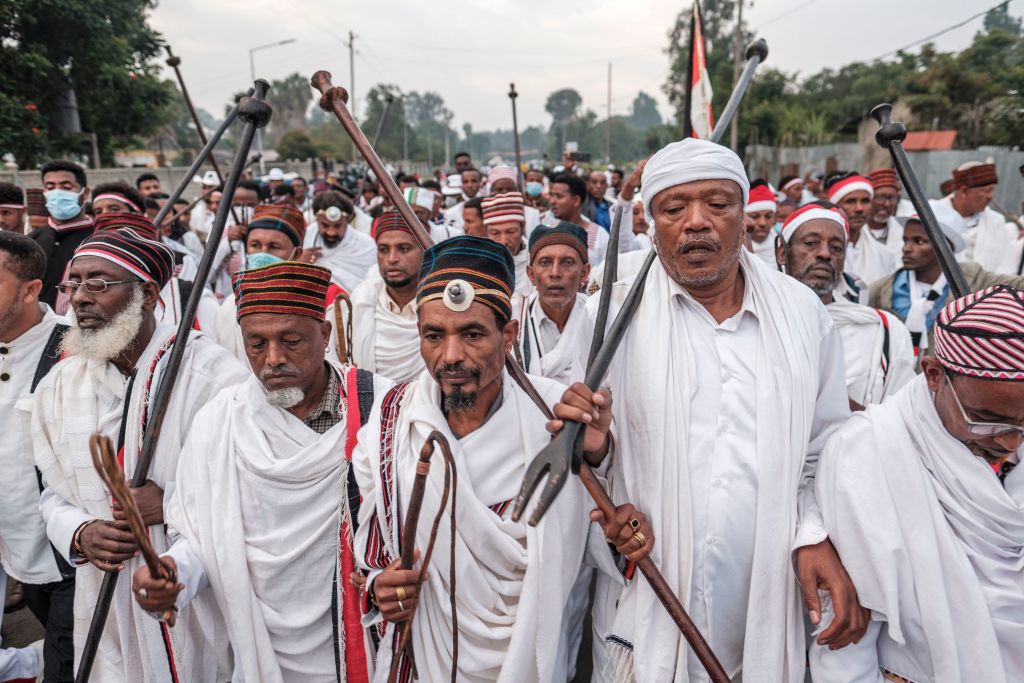Can Traditional Leaders Help Bring Justice to Ethiopia?
ADF STAFF
Sahle-Work Zewde may hold a largely ceremonial role as Ethiopia’s president, but she succinctly captured the plight of Africa’s second-most-populous country when she recently addressed parliament.
“We have not succeeded in creating a national narrative that would bring us together,” she said in the opening session on October 9. “We have remained divided and have failed to accommodate our differences, resulting in conflicts and wars with irreplaceable costs.”
Political violence and ethnic and territorial disputes have torn Ethiopia apart for years. But in the wake of a bloody, two-year civil war, the country is looking for dialogue, reconciliation and justice.
Experts say Ethiopia’s formal justice system should be augmented by traditional systems, which typically handle local disputes.
“Ethiopia has a wealth of traditional dispute-resolution mechanisms that help achieve reconciliation, mend fractured relationships and preserve communal harmony,” Addis Ababa-based researcher Tadesse Simie Metekia wrote for the Institute for Security Studies.
“Traditional mechanisms could help deliver justice on a larger scale and in places where the formal system struggles. Since Ethiopia aims to reckon with multiple cases and periods of violence, the sheer volume of cases could overwhelm the formal justice system.”
Home to more than 120 million people and more than 80 ethno-linguistic communities, Ethiopia has been in the throes of violence since November 2020, when the federal army and regional militias fought against the Tigrayan People’s Liberation Front, a political and military group in the country’s northernmost region, Tigray.
International observers accused all sides of committing war crimes and human rights violations. The fighting halted with a treaty in November 2022, but fresh violence in the neighboring Amhara region threatens the fragile peace process.
In January 2023, Ethiopia’s Ministry of Justice released a document designed to start a public discussion on options for transitional justice. It laid out the challenges of finding a role for traditional justice systems:
“There is experience of traditional systems complementing formal processes in the searches for truth, amnesty and reconciliation procedures. However … in Ethiopia’s unique setting, the extremely diverse ethnic and religious composition of its communities implies that it will prove extremely difficult to find a traditional justice system that can be implemented nationally. Therefore, while their involvement is crucial and this must be recognized, their engagement should be predicated on proper assessment and identification of roles in localized contexts. This is achieved by recognizing their status and establishing pertinent subject matters and geographic areas which require their involvement.”
Studies have shown that Ethiopians prefer to have disputes resolved through traditional bodies. A Harvard University survey published in 2023 found that 80% of Ethiopians, with some minor variance by regions, believe that traditional means should be used to address violence.
“Most of the population thought traditional actors and institutions were more in their interest, and more pertinent for peacebuilding, than the formal justice system,” Metekia wrote.
A 2021 survey by the Hague Institute for Innovation of Law showed that Ethiopia’s formal justice system typically resolves about 18% of legal disputes per year, while 43% go through traditional structures involving local elders, which handle about 3 million disputes a year.
The United Nations Human Rights Council mandated and created the International Commission of Human Rights Experts on Ethiopia (ICHREE), composed of three independent experts, in 2021.
In September 2023, it reported that crimes against humanity and war crimes were “grave and ongoing,” including violence in Amhara and attacks by Eritrean forces against civilians in Tigray.
In opposing the commission, Ethiopia has denied committing systematic abuses, forced U.N. investigators to work remotely from Uganda and organized support to end the ICHREE. The government instead has pushed its national justice policies as the best avenue of inquiry, which the U.N. commission described as “deeply flawed.”
ICHREE chair Mohamed Chande Othman warned the U.N. Human Rights Council on September 21 that ending the investigation would be “a devastating message to the victims and survivors of this conflict.” But its mandate lapsed on October 4, when a U.N. website showed that no member nation had motioned to renew it.
“There is no need to talk about a dead end,” government spokesperson Legesse Tulu told Reuters.
With transitional justice likely in the hands of Ethiopian authorities, Metekia believes elders could lead or facilitate talks if a truth and reconciliation commission were to be established.
“Ethiopia needs a grassroots concept of peace and justice that transcends communities,” he wrote. “This would help in mobilizing public support for healing the nation’s wounds, compensating and assisting victims to recover, truth-telling, remembering the past, and forgiving or prosecuting wrongdoers.”
Zewde said she eagerly anticipates the national dialogue beginning this year.
“This will open a significant opportunity to build an all-inclusive and peaceful state,” she said.


Comments are closed.